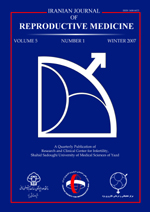
|
International Journal of Reproductive BioMedicine
Research and Clinical Center for Infertility, Shahid Sadoughi University of Medical Sciences of Yazd
ISSN: 1680-6433
EISSN: 1680-6433
Vol. 8, No. 4, 2010, pp. 179-184
|
 Bioline Code: rm10031
Bioline Code: rm10031
Full paper language: English
Document type: Research Article
Document available free of charge
|
|
|
International Journal of Reproductive BioMedicine, Vol. 8, No. 4, 2010, pp. 179-184
| en |
The effects of Cassia italica leaves aqueous extract on non-pregnant uterus contraction in rats
Ahangarpour, Akram & Oroojan, Ali Akbar
Abstract
Background: Cassia italica or Senna is a wild plant distributed in south of Iran. It increased water consumption and has a laxative effect. In traditional medicine this plant has been used for the dysmenorrheal.
Objective: In this study we investigated the effect of aqueous extract of Cassia italica on uterus contraction.
Materials and Methods: Virgin Wistar rats 200-300g were purchased. After laparatomy, a piece of uterus (1.5cm) was excised and mounted in an organ bath (10ml) containing De Jalon (29°C) and isometric contractions were recorded under 1g tension. KCl (60mM) was used to produce contractions. Cassia italica extracts after washing were added at 0.5, 1, 2 and 4 mg/ml cumulatively to the organ bath and the contractions were recorded. Uterus was separately incubated with atropine sulfate (10μM), metoclopramide (10μM) and oxytocin (10mU/ml) and the tissue spasmodic effect of the extract were recorded.
Results: Cumulative concentrations of the extract (0.5-4 mg/ml) increased the basal, peak and frequency of uterus contractions, dose-dependently (p<0.001). Incubation of the tissue with atropine sulfate and metoclopramide did not reduce the spasmodic effect of the extract. Cassia italica extract was shown the oxytocic activity on the uterine smooth muscle which most concentrations of the extract (4mg/ml) were more potent than of oxytocin (10mU/ml).
Conclusion: Cassia italica stimulated the uterus contractions without involving dopaminergic (D2), and muscarinic receptors. This extract has oxytocin mimetic effects on uterus. Since the extract has uterus contraction, therefore we suggest that more study will be necessary about abortive or contraceptive effects of this plant on pregnant uterus.
Keywords
Cassia italica, Atropine, Oxytocin, Uterus.
|
| |
© Copyright 2010 - Iranian Journal of Reproductive Medicine
Alternative site location: http://www.ijrm.ir
|
|
